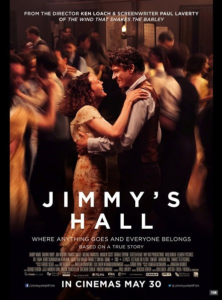
 An earnest and intimate telling of the events leading up to the deportation of Irish communist leader Jimmy Gralton, filmmaker Ken Loach’s straight-laced “Jimmy’s Hall” in another fine film in the director’s canon.
An earnest and intimate telling of the events leading up to the deportation of Irish communist leader Jimmy Gralton, filmmaker Ken Loach’s straight-laced “Jimmy’s Hall” in another fine film in the director’s canon.
When Jimmy Gralton (Barry Ward) returns home from after a decade of exile in America, he finds many obstacles in pursuing his old ways. The poverty and oppression of the time leads him to once again become an activist and to re-open a dance hall that previously resulted in his forced deportation. While he is well-received by the working class, others see him and his philosophy as a threat. The church led by Father Sheridan (Jim Norton) is most opposed to him, because he challenges their dominance and publicly promotes freedom of religion in his hall. The battle of wills is less political as economic forces drive the effort to once again remove him from Ireland.
Having no familiarity with the subject, I found the depiction of the time and events to be fascinating. Ward is excellent in the role, playing Gralton as a quietly charismatic man with a inner sense of conviction. And in our time, when Bernie Sanders campaigns for President, pontificating on what some would characterize as a Socialist platform, it is hard for any of us to understand why Gralton is handled so unfairly in “Jimmy’s Hall.” Loach, working from a script by Paul Laverty adapting a play by Donal O’Kelly concentrates intensely on the injustice without providing much context.
The film opens with a series of title cards that try to set the stage. The opening credits are placed against archived footage of the Great Depression in New York City. This is explained later. Naturally, Gralton has traveled back to Ireland from NYC, but the Great Depression itself had a direct impact on Ireland in that money and support from America has waned. This provides fertile ground for oppression and fear of those that might organize the masses.
“Jimmy’s Hall” is another example of Ken Loach’s no-frills, confident filmmaking. It’s been 9 years since his “The Wind that Shakes the Barley” won the Palme d’Or at Cannes. Like that film, Loach worked from a Laverty script about Ireland. Clearly, Loach has a feel for the material and his sure-hand at the helm is solid in this somewhat muted narrative.
And that why “Jimmy’s Hall” works as well as it does. It intimately focuses on a volatile time detailing the struggle to civilly organize and defend positions within the system. The law is bandied around and spoken of softly throughout. And it just seems like as polite as everyone is to one another, those in power are hardly interested in justice. Times may have changed but the need to question the establishment is ever-present.
